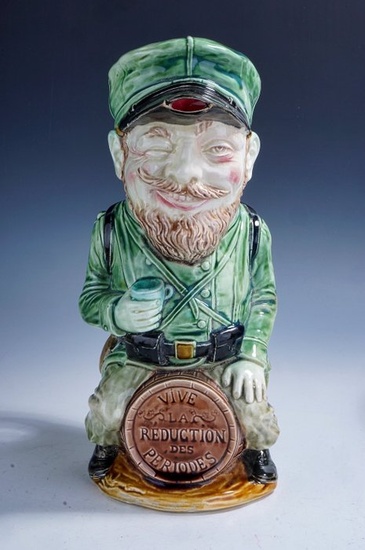La Faïencerie d’Onnaing - Pitcher - Polychrome Majolica Barbotine Pitcher, 'Drunken Army reservist • n° 752 - Maiolica
Very beautiful polychrome Art Nouveau Carafe with the title 'Vive la réduction des périodes' made at the beginning of the First World War. Manufactured by La Faïencerie d'Onnaing. This is probably a plea for shortening military service. The large carafe is in excellent condition with minor signs of wear. Has a shrinkage flaw on the top edge. This absolutely does not detract from the decorative value of this exceptionally rare decanter. These La Faïencerie d'Onnaing decanters are now widely collected worldwide.
Without a doubt a museum piece. has some usage damage to the spout and handle. This does not detract from the decorative value of the special jug.
This jar is mentioned in the book 'Pichets en Barbotine' by Maryse Bottero.
Marked with the La Faïencerie d'Onnaing mark and number 752
Background information
La Faïencerie d'Onnaing in northern France was controlled by the Mouzin family in the second half of the nineteenth century. The pottery produced majolica from 1870 to 1900. Clay was imported from England, Germany and Belgium to supplement local supplies and produce a pottery that was slightly lighter than that of other potteries. The color palette of the glazes used at Onnaing was somewhat duller than that of the competition and was often applied haphazardly.
Best known among Onnaing majolica is a large series of Art Nouveau style jugs, each with a different flower. The pottery also produced a variety of whimsical figure jars and asparagus serving pieces.
Onnaing majolica is usually marked with a depressed shield surmounted by a crown and the word Frie on the left and Onnaing on the right and the words MADE IN FRANCE below. Source 'The Majolica International society',
View it on
Sale price
Time, Location
Auction House
Very beautiful polychrome Art Nouveau Carafe with the title 'Vive la réduction des périodes' made at the beginning of the First World War. Manufactured by La Faïencerie d'Onnaing. This is probably a plea for shortening military service. The large carafe is in excellent condition with minor signs of wear. Has a shrinkage flaw on the top edge. This absolutely does not detract from the decorative value of this exceptionally rare decanter. These La Faïencerie d'Onnaing decanters are now widely collected worldwide.
Without a doubt a museum piece. has some usage damage to the spout and handle. This does not detract from the decorative value of the special jug.
This jar is mentioned in the book 'Pichets en Barbotine' by Maryse Bottero.
Marked with the La Faïencerie d'Onnaing mark and number 752
Background information
La Faïencerie d'Onnaing in northern France was controlled by the Mouzin family in the second half of the nineteenth century. The pottery produced majolica from 1870 to 1900. Clay was imported from England, Germany and Belgium to supplement local supplies and produce a pottery that was slightly lighter than that of other potteries. The color palette of the glazes used at Onnaing was somewhat duller than that of the competition and was often applied haphazardly.
Best known among Onnaing majolica is a large series of Art Nouveau style jugs, each with a different flower. The pottery also produced a variety of whimsical figure jars and asparagus serving pieces.
Onnaing majolica is usually marked with a depressed shield surmounted by a crown and the word Frie on the left and Onnaing on the right and the words MADE IN FRANCE below. Source 'The Majolica International society',



